The Prospects Before Us
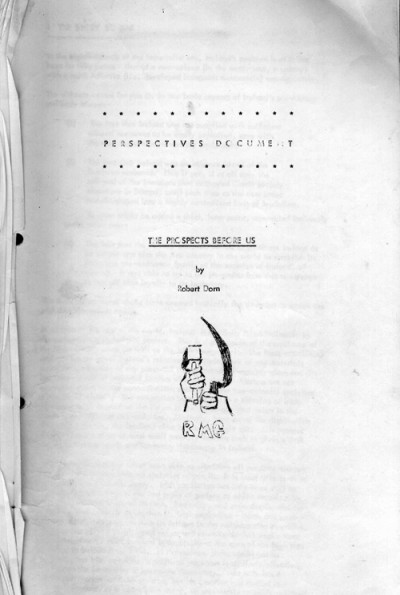
| Date: | 1978 |
|---|---|
| Organisation: | Revolutionary Marxist Group |
| Author: | Robert Dorn |
| View: | View Document |
| Discuss: | Comments on this document |
| Subjects: |
Please note: The Irish Left Archive is provided as a non-commercial historical resource, open to all, and has reproduced this document as an accessible digital reference. Copyright remains with its original authors. If used on other sites, we would appreciate a link back and reference to The Irish Left Archive, in addition to the original creators. For re-publication, commercial, or other uses, please contact the original owners. If documents provided to The Irish Left Archive have been created for or added to other online archives, please inform us so sources can be credited.
Commentary From The Cedar Lounge Revolution
17th January 2010
The Revolutionary Marxist Group is an intriguing Trotskyist formation on the Irish left from the 1970s. Never very large it consisted of former members the League for a Workers Republic and Young Socialists, according to Wiki. Some of our regular contributors will, no doubt, add detail to this picture.
This a fascinating document, written by the pseudonymous “Robert Dorn”, that attempts in a number of chapters to provide a rationale (perhaps retrospectively) for the political position of the RMG and potential alternatives. In the course of engaging with that there’s some good analysis in here of Republicanism and Irish politics.
This ideology makes only fitful pretence to the Socialism claimed as the ideal by the movements in Britain and Europe. Here, of course, we refer to militant Republicanism (Gardiner Place and Kevin St.). At a later stage of development, we will have to face up to a further fact: that the form of Republicanism that exercises most hegemony over the workers is, still, neither that of Gardiner Place nor that of Kevin Street, but the pretender of Upper Mount Street; the Fianna Fáil cuckoo. The extreme vagueness of Republicanism [sic] precepts (basically: ‘Break the connections with England and you’ll be all alright’) enabled this situation to come about. The victory of the ‘Yes’ vote in the recent referendum exposed the limitations of militant ‘Separatism’ and the creed could give no reason such a vote was incompatible with their basic views.
And the mention of certain groups places this within a clear historic timeline.
The circumstances that have made for the predominance of Republican ideology in the Irish working class have prevented any sort of serious opposition from being counterposed to it. The Irish Labour Party developed from a rigorous application of a syndicalist economist interpretation of certain aspects of the teachings of James Connolly inevitably becoming an expression of petty bourgeois Social Democracy. Such an ideology only has its staying power in the metropolitan state of imperialism. Basically, Irish Social Democracy accepts that ireland is another such state. This is at loggerheads with the facts. It has cut off the I.L.P. From any permanent claim on Republicans and has left it to depend entirely on imperialism’s ability to industrialise Ireland: and ability, as we are seeing, of only limited range. The development of an apparent ‘Tribunite’ tendency around the Liaison Committee of the left is not based on an internal ‘Tribunite’ base, but on the influx of debased Trotskyists and Stalinists.
There are also harsh words for the Communist Party of Ireland…
But, of course, there is a further complication. Real Communists might have been able to survive and develop better than the vanguard with which (until recently) the Irish working class has been lumbered. The history of Irish Stalinism includes 1 1/2 liquidations of its party. The first (1923) was to accomodate to the Syndicalist, Larking. The second (1941) (in the Twenty-Six Counties only) was aimed to overcome the embarrassment that would be given to the USSR by its allied party supporting the war effort of Russia’s ally and Ireland’s oppressor.
There’s also some background to Trotskyism in Ireland.
A more certain Trotskyist strain was already developed. This was amongst certain of [Michael] Price’s followers but also amongst members of Fianna Éireann who were disillusioned with the lack of politics of the Republican leadership…After the War, these formed a short-lived Revolutionary Socialist Party of Ireland which constituted to the only Irish section fo the Fourth international to date. This never grew beyond twenty. It was liquidated early in 1950…
Later many of them were to be prominent around Noel Browne, during his last period of organisational independence. However, by this time, they had lost most of their original revolutionary fervour. They did not try to create a proper Bolshevik Party out of Noel Browne’s National Progressive Democrats…
A complaint - however sardonic - one doesn’t hear every day.
The document also deals with the RMG itself and clearly delineates its ideological position:
In January 1972, we broke finally with the LWG and its YS. In February we held our founding Conference. Since then, we have been guided by three main lines, as defined by the faction fight, as much as anything. (1) A general agreement with Comrade Ernest Mandel’s analysis of the developing crisis in world capitalism. (Though, in detail, a disagreement with his delineation of the qualitative change from Imperialism to neo-capitalism) and a resultant support for the Fourth International. (2) The general view that the main propaganda field is on the national issue. (3) Affiliation to the SLA. The weakness is, that except for the first and Comrade MacGregor’s bluepring for action in Northern Ireland, nothing much has been done to spell out this (in itself correct) strategy.
There’s a most interesting analysis of the prospects for entryism to either Official or Provisional Sinn Féin where one of the reasons not to try the former is..
…it’s traditional activism harnessed to the policies of its leadership means that real entry work will entail activity, not alone time wasting, but of an actively counter-revolutionary nature. Trotskyist entrists will have to agitate for a ‘Northern Irish Bill of Rights’ and to sell the United Irishman with its libellous attacks on our politics. (This is more than was expected of Troskyists in the Labour Party). In the case of Kevin Street, there is always the pitfall of its undoubtedly Fascist (Fennell) wing and that it will distort the course of the struggle.
There are many names already familiar to those who have studied this topic over the years, and it’s written in a readable and in places highly entertaining style. Well worth considering.
More from Revolutionary Marxist Group
Revolutionary Marxist Group in the archive
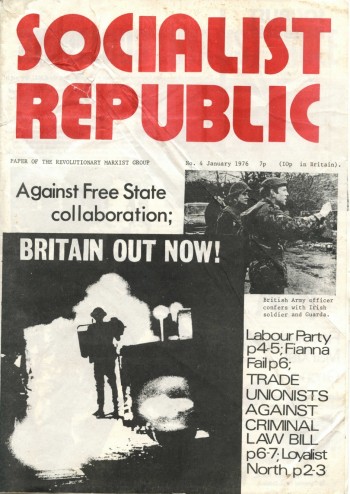
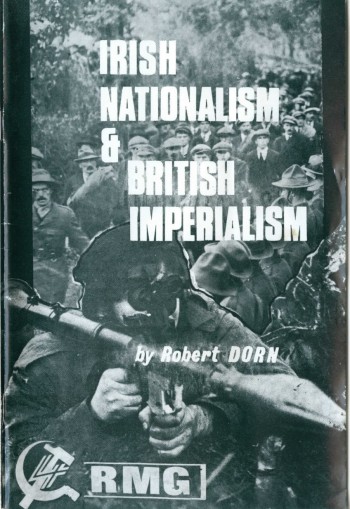
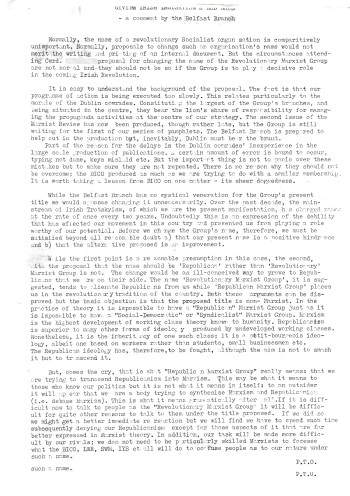
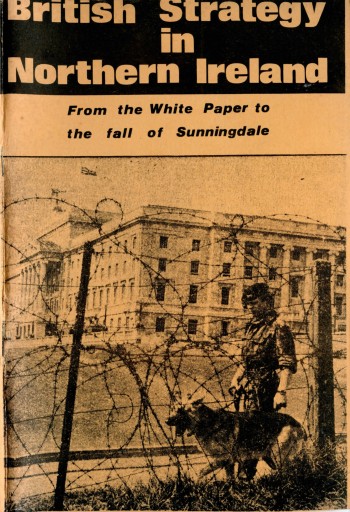
Comments
No Comments yet.
Add a Comment
Comments can be formatted in Markdown format . Use the toolbar to apply the correct syntax to your comment. The basic formats are:
**Bold text**
Bold text
_Italic text_
Italic text
[A link](http://www.example.com)
A link
You can join this discussion on The Cedar Lounge Revolution
By: Joe Thu, 21 Jan 2010 16:07:00
TNMN. As sasanach anois = out of an English person now.
As Béarla anois = In English (language) now. [Béarla comes from béalra = (literally, sort of) mouthing (béal=mouth)].
Terrible the way the Gaeilge brings out the finger wagging teacher in me.
Are you still with us ejh? Interesting too that the word milis in Irish means sweet in English. The sweet milis.
Going way back pre-Norman into the realms of legend, we had the Milesians (precursors of the milis?) who, if memory serves, came from Greece. They ran the show here for a while till they were done by the Formorians who got done by the Tuatha Dé Danann, probably not in that order.
Pre-Elizabethan Ireland had the gaelic clan culture – them clans could outdo any trot sect for splits and fusions.
Where this all comes or goes I have no idea but, on pre-Elizabethan Irish society, I’m sticking with crypto-feudal until somebody convinces me otherwise.
Reply on the CLR
By: WorldbyStorm Thu, 21 Jan 2010 17:30:14
Crypto-feudal sounds about right to me…
Reply on the CLR
By: ejh Thu, 21 Jan 2010 19:59:31
In reply to Joe.
Are you still with us ejh?
See, when I was a kid I did a seance or two but at least I wasn’t the one they were calling on then
Reply on the CLR
By: Jim Monaghan Fri, 22 Jan 2010 13:51:01
On the feudal thing, which arises in discussing Connolly rather rosy approach. Let me point out that there was a change in land ownership from the Clan to the Chief when the chiefs became Earls etc.
Also in feudal Europe when a war occurred the peasants were part of the property transferred. In Ireland there were plantations where everyone was driven to the poorer lands.
Agreed an archaic debate as regards current ploitis but nevertheless of historical interest.
There is a debate in the FI about Chavez. Yes, along with most of the FI if not all Venezuela is considered a Capitalist state but it is in the midst of a process. Whether like Castro, Chavez will be able (I feel he is willing) to drive it to a socialist conclusion, or it will be driven back we will have to wait and see. I hope the workers of Ven. will succeed.
I grant the point that there will always be those who are too uncritical but there are always those who are just critical.
See debate in
http://www.internationalviewpoint.org/
and Socialist Action article by Gerry Foley
Chavez Calls for a Fifth International
http://www.socialistaction.org/foley147.htm
Here we will have to wait and see and do our solidarity in case the USA intervenes.It is unfortunate that your more Grantite cousins rather than build solidarity in the broadest fashion try and own the campaign. If they were not bogged down in Iraq and Afghanistan I am sure they would do so.
When an oppressed people go in struggle against Imperialism and the same goes for a group of workers, unless we are the leadership we are not likely to decide on startegy and tactics. But we have to take sides. When Imperialism tries to label 1000s of young workers from the nationalist community as mere criminals. After Bloody Sunday the young in the Ghettoes wanted to fight. I might have advocated other mass action forms of struggle but in that context who would have listened. That they wanted to fight and adopted a strategy that could not win is a fact. But and this is decisive a mistaken apporach is not an excuse to line up with Imperialism. The WP became obsessed with the Provos and demonised the masses who followed them. I know where I stand. I disagreed as an Irish revolutionary with the military campaign (I used to use the shorthand discription that I was a 1972 stick) but not putting this disagreement in the context of the effect of Imperialism and the decision to attack the nationalist population is misguided.
To take a “classic” struggle like the miners. I think that Scargill made strategic mistakes.He was the greatest asset and the greatest liability for the miners at the same time, a titan of Larkinist proportions. But he was their leader and anyone who did not support the miners struggle, well you need to know which side you are on.Not only did the miners lose, the industry disappeared.
In the Middle East like I would guess all of us I would be queasy about living under Hamas or such like but I will not line up with Imperialism against those who fight. It is not for me to lecture those who see in Hamas fighters who are not corrupt and who are willing to fight.
When people talk of unity of workers they should look at the country as a whole, North and South. Partition and the acceptance by the 26 county rulers of it has created a partitionist mentality. I assume that the SP regard this as one country otherwise their comrades in belfast would be in their British section. Leading on from that I assume they regard the national struggle as unresolved as least on a theoritical level.
The line of Haddon and co could be written by any milk and water liberal nevermind socialist.
Groups, parties etc. come and go, Trotskys favourite party, the American SWP is now a mere sect. There are many reasons for this, sometimes repression,, sometimes a lurch into sectarianism, people get worn out, the times are bad etc. The Northern uposurge ran out of steam dut to mainly the militarist approach by the Provos. This meant that those who prioritised it also were weakened.
Some groups continue for evr no matter the objective circumstances, eg the SPGB.
Because of the work the SP and Higgins have done there is a certain momentum and a certain responsibility to the class. There are things you can do or try to, will you put the conservative and narrow interests of the group on top or will you give a lead to the broadest layers to go into struggle. The ICTU/SIPTU have been successful demobilising the workingclass over the last year. I am not saying that with a wave of the hand the SP or any combination can offset this but you have to try.
Alas, I think you will go for a narrow agenda.
Reply on the CLR
By: Left Archive: Marxist Review, Theoretical Journal of the Revolutionary Marxist Group, No.3, Spring 1973 « The Cedar Lounge Revolution Mon, 19 Jul 2010 06:12:07
[…] by Jim Monaghan, is of particular interest. We’ve already considered some material from the Revolutionary Marxist Group, but this expands upon their analysis and during a period of particular change on the further left […]
Reply on the CLR
By: Left Archive: Socialist Republic (incorporating The Plough), Paper of the Revolutionary Marxist Group No. 1 c.1975 « The Cedar Lounge Revolution Mon, 16 Jul 2012 02:36:09
[…] noted previously the Revolutionary Marxist Group was a Trotskyist group in Ireland in the 1970s. With members drawn […]
Reply on the CLR
By: delivering detailed news Wed, 22 Nov 2017 15:45:36
Interim Management China
The Left Archive: The Prospects Before Us – Revolutionary Marxist Group, 1970s | The Cedar Lounge Revolution
Reply on the CLR